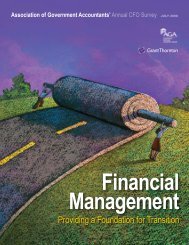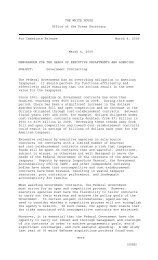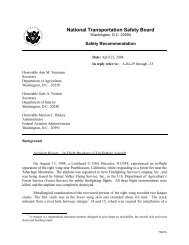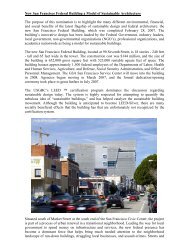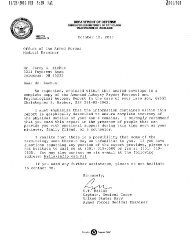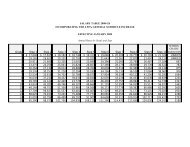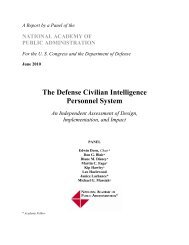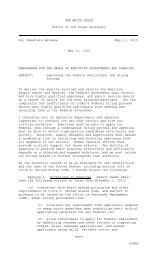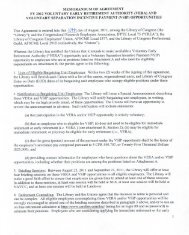Accenture's fifth annual global e-government study
Accenture's fifth annual global e-government study
Accenture's fifth annual global e-government study
You also want an ePaper? Increase the reach of your titles
YUMPU automatically turns print PDFs into web optimized ePapers that Google loves.
and Kingdom Affairs, Economic Affairs<br />
and Finance.<br />
In the first quarter of 2004, the <strong>government</strong><br />
presented its Federal ICT (Information and<br />
Communications Technology) Agenda, focused on<br />
more effective and efficient use of information and<br />
communications technology in the Netherlands. This<br />
report describes multiple qualitative goals, as well as<br />
existing and future projects to reach those goals.<br />
Although this renewal of the vision concerning<br />
eGovernment shows commitment from the Dutch<br />
<strong>government</strong>, there was no mention of centralized<br />
budgets for the projects mentioned in the Federal<br />
ICT Agenda.<br />
Despite the lack of centralized budgets, the Federal<br />
ICT Agenda reports that the Dutch <strong>government</strong> aims<br />
for 65 percent of total public services to be available<br />
online in 2007, as well as the vast majority of public<br />
tenders to be handled electronically before the end<br />
of 2005.<br />
To measure progress against its action plan, the<br />
Netherlands is using several methods, including<br />
surveys, online panels and usability testing. Each<br />
ministry (as well as other <strong>government</strong>al institutions)<br />
conducts its own research into progress. The country’s<br />
decentralized approach to implementing and<br />
measuring eGovernment may have hindered the<br />
country’s progress in the past. However, the <strong>government</strong><br />
is making an effort to collect the disparate<br />
sources of information and house the content on<br />
one central website, http://advies.overheid.nl/<br />
index.jsp. Having this information available in one<br />
place should facilitate identifying opportunities for<br />
improvement. The Overheid.nl Monitor looks at five<br />
aspects of eGovernment quality: user friendliness,<br />
general information, administrative information,<br />
services and potential for participation.<br />
The country also ranks its own performance, compared<br />
to other leading countries, in five information<br />
and communications technology areas through<br />
its “ICT toets.” Results from its most recent tests<br />
showed that Dutch businesses score highest in their<br />
use of customer relationship management software<br />
in comparison to businesses in other countries. Five<br />
percent of the country’s national product is spent on<br />
information and communications technology, which<br />
makes it fourth behind the United Kingdom, the<br />
United States and Sweden. According to the ICT<br />
toets, the Netherlands is one of the countries most<br />
active in preventing cyber crimes.<br />
As part of its efforts to increase citizen take-up<br />
of services, the Netherlands held numerous marketing<br />
campaigns (www.postbus51.nl) to promote its<br />
eGovernment availability in 2003. Belastingdienst<br />
(how to file taxes electronically through CD-ROM),<br />
Nationale Ombudsman (where to file complaints<br />
about <strong>government</strong>al services), Provinciale Staten<br />
Verkiezingen 2003 (where to find online information<br />
about the elections) and Paspoort (where to find<br />
information about what to do about a lost passport)<br />
were the notable campaigns. The <strong>government</strong> also<br />
held a number of conferences and hosted several<br />
award programs to promote eGovernment.<br />
Additionally, the Ministry of Interior set up a website<br />
to obtain feedback from individuals and organizations<br />
about eGovernment services and needs of the<br />
“electronic civilian,” at www.burger.overheid.nl.<br />
As it encourages take-up, the Netherlands is taking<br />
the issue of privacy and Internet security seriously.<br />
In the coming year, the <strong>government</strong> intends to<br />
introduce a single unique identifier within a public<br />
key infrastructure for electronic interaction with the<br />
<strong>government</strong>. In the future, all Dutch citizens and<br />
business will have their own smart card, containing<br />
electronic certificates for identification, signature<br />
and encryption. The Federal ICT Agenda sets 2008 as<br />
a deadline for implementation of this card to keep<br />
up with the European information and communications<br />
technology agenda. The <strong>government</strong> also has<br />
established the Computer Emergency Response<br />
Team-Rijks Overheid to provide trustworthy and realtime<br />
information about viruses and other damaging<br />
software to public organizations.<br />
The Netherlands has taken serious steps to improve<br />
its eGovernment program over the past year. While<br />
its decentralized approach may be impeding progress,<br />
its customer focus, interest in performance measurement<br />
and emphasis on building private and secure<br />
electronic transactions are strong foundations for<br />
securing its top-10 position in future rankings.<br />
89



